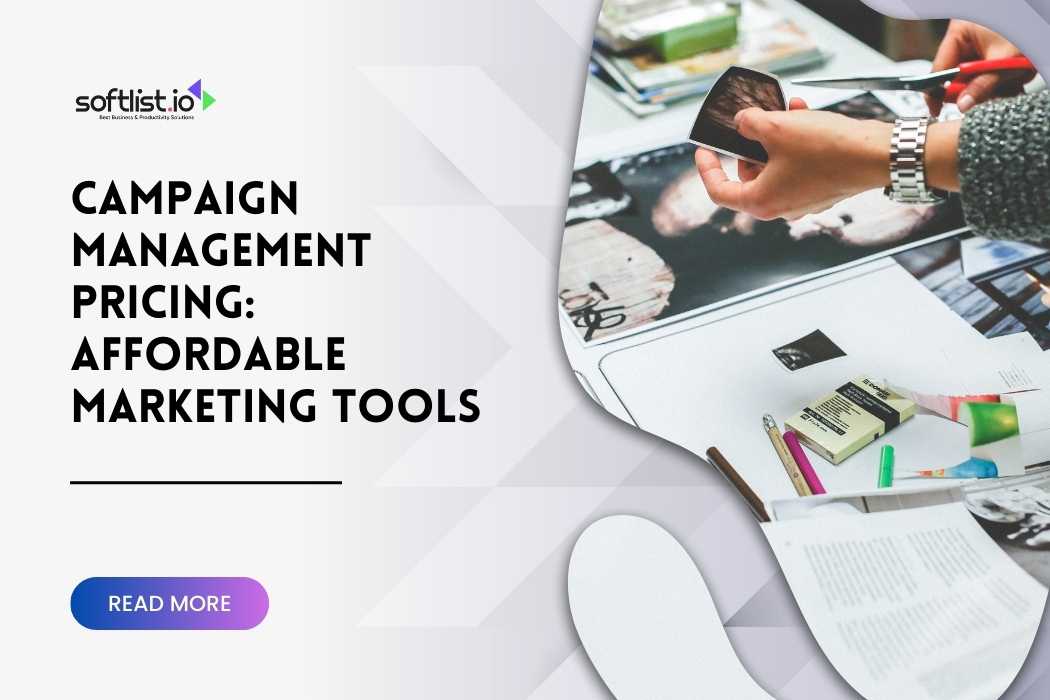Campaign management is very important for marketing success in today’s constantly changing digital world. Understanding the various pricing models available for these services is crucial, as it directly impacts budget allocation and campaign performance.
This article explores the diverse pricing strategies in campaign management, helping businesses navigate through options like percentage of ad spend, flat-rate retainers, and performance-based fees.
We’ll provide insights on aligning these models with your business goals to optimize both your financial investment and campaign outcomes. Whether you’re a small startup or a large enterprise, mastering these principles is essential for maximizing your marketing efforts.
Determining Business Goals and Needs
Source: Canva Pro
Before diving into the realm of campaign management, it’s imperative for businesses to clearly define their marketing objectives. Good campaign management hinges on aligning every marketing campaign with the strategic goals of the organization.
Whether the aim is to enhance brand visibility on social media platforms, increase engagement through email marketing campaigns, or drive sales via targeted advertising, understanding these objectives guides the selection of an appropriate campaign management tool.
This alignment ensures that marketing activities are not only effective but also resonate well with the target audience.
Assessing budget constraints
The choice of a campaign management model is deeply influenced by budget considerations. Effective campaign planning requires a realistic assessment of financial resources to ensure that marketing campaigns don’t suffer from financial limitations, which can impede their success.
Businesses must evaluate their budget to decide whether high-end campaign management software or a more cost-effective solution suits their needs.
Marketing automation, a component often integrated with CRM systems, can be a significant expense, but its benefits for content marketing and other marketing channels are indispensable for scaling marketing efforts efficiently.
A Comprehensive Guide to Campaign Management Pricing Models
Source: Canva Pro
This pricing model is particularly favored for its direct correlation with the scale of marketing campaigns. Agencies employing this model charge a fee based on the percentage of expenditure allocated to the campaigns.
It’s especially advantageous for businesses that spend heavily on advertising across various marketing channels, including social media platforms and search engines. However, while this model offers simplicity and scalability, it requires careful management to ensure that expenses are aligned with campaign effectiveness and not just spending.
Retainer (Flat-Rate) Model
A retainer or flat-rate model offers a straightforward pricing approach where businesses pay a fixed fee for a suite of services. This model is suitable for companies that desire consistency in billing and wish to avoid the fluctuations associated with other models.
It works well for marketing teams that have a continuous need for marketing campaign management across multiple platforms, including direct email marketing and social media engagement. The predictability of costs helps with better budget management and financial planning.
Performance-Based Pricing
Tying fees to campaign performance, this model promises marketing teams that they only pay when predefined objectives are achieved, such as leads, sales, or other conversion metrics. This incentivizes the campaign manager to optimize marketing campaigns for peak performance, aligning the interests of both the service provider and the client.
However, the dependency on achieving high-performance metrics might lead to a focus on short-term gains rather than building long-term brand value, which is a consideration businesses must be aware of when choosing this model.
Each of these models has its own unique set of advantages and challenges, and the choice largely depends on how well they integrate with a company’s marketing strategy and financial capabilities.
By carefully considering these pricing models, businesses can ensure that their investment in campaign management yields the best returns, enhancing the effectiveness of their marketing activities across all chosen marketing channels.
Choosing the Right Pricing Model

Source: Canva Pro
Choosing the right campaign management model is essential for ensuring effective campaign management that aligns with your marketing strategies. It is crucial to compare different pricing models to identify which one best supports your types of marketing campaigns and overall marketing efforts.
For example, if lead management and conversion are top priorities, a performance-based model might be most effective. Alternatively, if your focus is on managing a consistent social media campaign throughout the campaign calendar, a retainer model could offer the stability needed for great campaign management.
Transparency and Flexibility in Pricing
A guide to marketing campaign management would not be complete without emphasizing the importance of transparency and flexibility in the pricing model. Effective marketing campaign strategies depend on a clear understanding between the client and the service provider about what each pricing model entails and how it can be adjusted to meet changing needs.
This flexibility is vital for adapting to different types of marketing, whether it involves social media marketing, email campaigns, or broader digital marketing initiatives on various marketing platforms. Ensuring that the management system allows for this adaptability without hidden costs is key to long-term campaign success.
The Strategic Role of a Campaign Manager

Source: Canva Pro
The role of a campaign manager is central to the campaign management process. These professionals utilize a range of campaign tools and are responsible for overseeing the project management aspects of marketing campaigns.
Their daily tasks include setting up and monitoring marketing platforms, coordinating with content creators, analyzing performance data, and adjusting strategies as needed to improve campaign outcomes. Effective campaign management relies on their ability to keep all aspects of the campaign aligned with the strategic goals throughout its duration.
Strategic Importance
Great campaign management involves much more than simply overseeing daily operations. It also entails strategic planning and execution that ensure all marketing efforts are cohesive and effectively targeted.
A campaign manager’s strategic input is crucial in designing an effective marketing campaign that resonates with the intended audience and achieves desired outcomes. Their expertise in understanding the nuances of different types of campaign strategies and how to leverage various marketing platforms is invaluable in crafting campaigns that not only engage but also convert.
In summary, the choice of a pricing model and the strategic role of a campaign manager are pivotal elements in the realm of campaign management. These sections provide insights into making informed decisions that enhance the efficiency and success of marketing campaigns across various channels and marketing efforts.
Whether you are managing a social media campaign or a multi-channel marketing project, understanding these aspects will help ensure that your campaign management is effective and aligned with your business goals.
Effective Campaign Planning and Management
Developing a strategy for a marketing campaign is a foundational step in ensuring its success. This involves setting clear campaign objectives that align with broader marketing goals. A good marketing campaign management tool can facilitate this process, allowing campaign managers to outline the scope, target demographic, and key messaging of the campaign.
Utilizing a marketing campaign management template can also streamline the planning phase, ensuring that all aspects of the campaign are cohesive and well-organized. This strategic plan serves as the blueprint for executing a campaign that resonates with the intended audience and meets set objectives.
Execution and Management
Once a strategy is in place, the next step is to manage the campaign effectively. This includes the deployment of marketing content across different marketing channels, such as digital marketing platforms or multichannel campaigns. Campaign management involves continuous monitoring and adjustment of campaign performance to optimize results.
Effective work management within the campaign team is crucial, as it ensures that tasks are completed on time and marketing initiatives are implemented as planned. Tools you need for effective execution might include CRM and campaign management software, which help in tracking interactions and refining strategies to build awareness and engagement throughout the campaign.
Measuring and Adjusting Campaign Success
Key Performance Indicators (KPIs)
To evaluate the success of a marketing campaign, it is important to identify and monitor the right key performance indicators (KPIs). These metrics provide insights into how well a campaign is performing in relation to its objectives.
Common KPIs might include conversion rates, engagement rates, and overall reach. Selecting the appropriate KPIs allows businesses to measure the effectiveness of their marketing content and strategies, ensuring that they are contributing positively to the broader marketing objectives.
Adjusting Strategies
Campaign management is an ongoing process that requires adaptability and responsiveness. As campaign data comes in, it may become necessary to adjust strategies to enhance campaign performance. This could involve shifting focus to different types of marketing strategies or refining the marketing initiatives based on audience response.
The benefits of campaign management include the ability to use real-time data to make informed decisions that can significantly improve campaign outcomes. Regular reviews and adjustments ensure that the campaign continues to align with dynamic market conditions and business goals.
Effective campaign planning and management, along with diligent measurement and adjustment, are critical components of successful marketing efforts. By understanding and implementing these phases, businesses can maximize the impact of their campaigns and achieve their marketing goals through precise and effective campaign execution.
Whether you aim to manage a campaign for direct response or to build broader brand awareness, these steps are part of your marketing arsenal to drive success.
Final Thoughts
Managing campaigns well is important for getting a good return on investment (ROI) from marketing and making sales and marketing efforts more successful overall. Businesses can make campaigns that fit their goals and budget by learning about the different pricing models and strategy roles that go along with them.
A strong marketing campaign management process and great campaign management tools make sure that every part of the campaign is planned, carried out, and changed correctly, resulting in a campaign that effectively targets the right audience.
For a campaign to build recognition and get people to buy, it’s important to use omnichannel marketing strategies, manage social media, and pay close attention to every step of the planning process. When marketing teams use these tools and tactics, their campaigns often do better, their audiences are more interested, and they get a better return on their investment.
If you’re interested in unlocking your creativity with AI Art Generators, visit Softlist’s ‘AI Art Generator’ category for innovative tools that transform your artistic vision into reality.
Frequently Asked Questions
What is meant by campaign management?
Campaign management is the process of organizing, executing, and monitoring a marketing campaign from start to finish. It involves setting campaign goals, planning marketing activities, executing the strategy, and measuring the outcomes to ensure alignment with the overarching business objectives.
Why is campaign management important?
Campaign management is important because it helps ensure that every marketing initiative is aligned with the business’s larger marketing goals. Effective management also allows for real-time adjustments that can improve campaign outcomes and optimize resources across many marketing teams.
What is the role of a campaign manager?
Marketing campaign managers are responsible for overseeing the campaign planning process, coordinating with different teams, and ensuring that the campaign goals are met. They use various tools to make the management process more efficient and to track the campaign’s performance throughout its lifecycle.
What is campaign planning and management?
Campaign planning and management involve defining the goal of your campaign, identifying the target audience, creating the content, choosing the appropriate marketing channels, and setting key performance indicators. This process ensures that each campaign aligns with the broader objectives of the organization and has clear benchmarks for success.
How is campaign management done?
Campaign management involves multiple steps: initially, you need marketing insights to define the objectives, followed by planning and resource allocation. During the campaign, you must execute the planned activities using the right tools that make management smoother. Post-campaign, you analyze the data to see how the campaign performed and gather insights to improve future campaigns.






